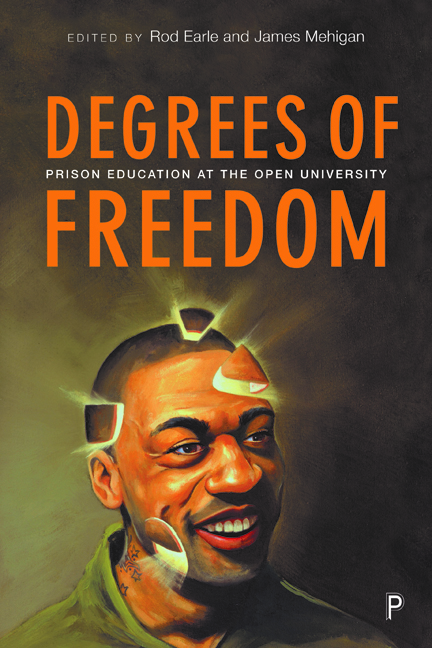Book contents
- Frontmatter
- Dedication
- Contents
- Notes on Contributors
- Acknowledgements
- 1 Openings and Introductions: Education for the Many, Prison for the Few
- 2 From Prisoner to Student
- Vignette 1 Choosing My Journey
- 3 Pioneers and Politics: Open University Journeys in Long Kesh During the Years of Conflict 1972–75
- Vignette 2 Avoiding the Mind-Numbing Vortex of Drivel …
- 4 A University Without Walls
- Vignette 3 Starting a New Chapter
- 5 Open Universities, Close Prisons: Critical Arguments for the Future
- Vignette 4 Out of the Abysmal
- 6 The Light to Fight the Shadows: On Education as Liberation
- 7 From Despair to Hope
- Vignette 5 Making my Commitment
- 8 Straight Up! From HMP to PhD
- 9 From Open University in Prison to Convict Criminology Upon Release: Mind the Gap
- Vignette 6 Message to a Prisoner
- 10 From the School of Hard Knocks to the University of Hard Locks
- 11 Becoming me with The Open University
- Vignette 7 Catching up with Kafka
- 12 From D102 to Paulo Freire: An Irish Journey
- Vignette 8 My Journey, My New Life
- 13 Ex-Prisoners and the Transformative Power of Higher Education
- Vignette 9 Prison Choices: Taking a Degree or Packing Tea?
- 14 What the OU did for me
- Appendix Study with The Open University
- Index
10 - From the School of Hard Knocks to the University of Hard Locks
Published online by Cambridge University Press: 11 March 2021
- Frontmatter
- Dedication
- Contents
- Notes on Contributors
- Acknowledgements
- 1 Openings and Introductions: Education for the Many, Prison for the Few
- 2 From Prisoner to Student
- Vignette 1 Choosing My Journey
- 3 Pioneers and Politics: Open University Journeys in Long Kesh During the Years of Conflict 1972–75
- Vignette 2 Avoiding the Mind-Numbing Vortex of Drivel …
- 4 A University Without Walls
- Vignette 3 Starting a New Chapter
- 5 Open Universities, Close Prisons: Critical Arguments for the Future
- Vignette 4 Out of the Abysmal
- 6 The Light to Fight the Shadows: On Education as Liberation
- 7 From Despair to Hope
- Vignette 5 Making my Commitment
- 8 Straight Up! From HMP to PhD
- 9 From Open University in Prison to Convict Criminology Upon Release: Mind the Gap
- Vignette 6 Message to a Prisoner
- 10 From the School of Hard Knocks to the University of Hard Locks
- 11 Becoming me with The Open University
- Vignette 7 Catching up with Kafka
- 12 From D102 to Paulo Freire: An Irish Journey
- Vignette 8 My Journey, My New Life
- 13 Ex-Prisoners and the Transformative Power of Higher Education
- Vignette 9 Prison Choices: Taking a Degree or Packing Tea?
- 14 What the OU did for me
- Appendix Study with The Open University
- Index
Summary
Criminal, trouble-maker, thug, failure, drop out … what do all of these descriptions have in common? They all comprise some of the only descriptions I used to think could, or would ever apply to me.
Academic, public speaker, community leader, scholar, university graduate … what do all of these descriptions have in common? They all represent descriptions which I never thought could, or would, ever apply to me.
What follows is an intimate account of how I went from the only thing(s) I thought I would ever be to something I thought I would never be, and the pivotal role which my engagement with The Open University (OU) played to that end.
Early days
Growing up for me wasn't all rainbows and unicorns. I was born and raised in the London borough of Hackney, where I lived for pretty much all of my pre-adult life. I had one (older) sibling and I used to see my father occasionally up until I was around six years of age, after which he disappeared; my mother was thus forced to play the role of two parents – which she wasn't the best at managing. I was very bright, even in primary school. I used to receive a lot of praise about this, however, perhaps unbeknownst to many around me, I used to suffer from an acute feeling of loneliness and perhaps what I may in refer to in hindsight as mild depression. I was always a very popular figure, yet I had very few friends and my extra-curricular activities were greatly restricted by my mother. In addition, I found her very difficult, if not impossible, to communicate with for constant fear of getting in trouble, or not being heard out. This meant that expressing my feelings to her were out of the question. Even if I had been able to do so, it would perhaps have been futile as it was clear that we were living in two different realities – she was a first-generation African woman who didn't understand the reality of the world of a young black boy born in the 1990s and growing up in Hackney, facing the various multifaceted challenges associated with doing so.
- Type
- Chapter
- Information
- Degrees of FreedomPrison Education at The Open University, pp. 153 - 164Publisher: Bristol University PressPrint publication year: 2019



